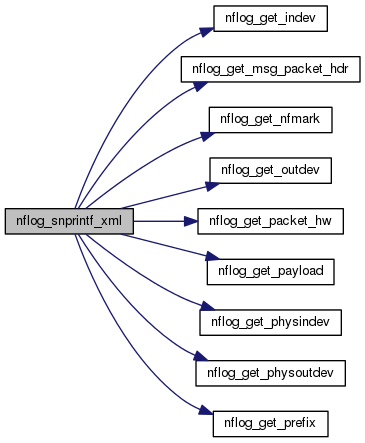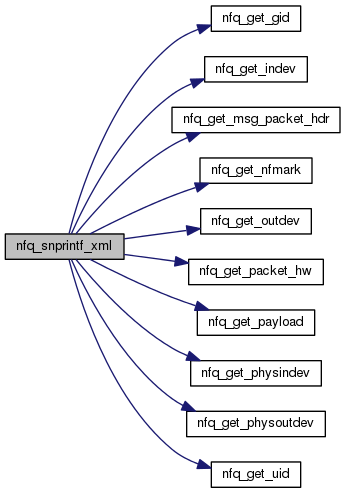Functions | |
| int | nflog_snprintf_xml (char *buf, size_t rem, struct nflog_data *tb, int flags) |
| nflog_snprintf_xml - print the logged packet in XML format into a buffer More... | |
| int | nfq_snprintf_xml (char *buf, size_t rem, struct nfq_data *tb, int flags) |
| nfq_snprintf_xml - print the enqueued packet in XML format into a buffer More... | |
| EXPORT_SYMBOL (nfq_snprintf_xml) | |
| EXPORT_SYMBOL | ( | nfq_snprintf_xml | ) |
| int nflog_snprintf_xml | ( | char * | buf, |
| size_t | rem, | ||
| struct nflog_data * | tb, | ||
| int | flags | ||
| ) |
nflog_snprintf_xml - print the logged packet in XML format into a buffer
| buf | The buffer that you want to use to print the logged packet |
| rem | The size of the buffer that you have passed |
| tb | Netlink packet data handle passed to callback function |
| flags | The flag that tell what to print into the buffer |
This function supports the following flags:
You can combine this flags with an binary OR.
References data, nfulnl_msg_packet_hdr::hook, nfulnl_msg_packet_hw::hw_addr, nfulnl_msg_packet_hw::hw_addrlen, nfulnl_msg_packet_hdr::hw_protocol, len, mark, nflog_get_indev(), nflog_get_msg_packet_hdr(), nflog_get_nfmark(), nflog_get_outdev(), nflog_get_packet_hw(), nflog_get_payload(), nflog_get_physindev(), nflog_get_physoutdev(), nflog_get_prefix(), NFLOG_XML_DEV, NFLOG_XML_HW, NFLOG_XML_MARK, NFLOG_XML_PAYLOAD, NFLOG_XML_PHYSDEV, NFLOG_XML_PREFIX, NFLOG_XML_TIME, NULL, size, and SNPRINTF_FAILURE.

nfq_snprintf_xml - print the enqueued packet in XML format into a buffer
| buf | The buffer that you want to use to print the logged packet |
| rem | The size of the buffer that you have passed |
| tb | Netlink packet data handle passed to callback function |
| flags | The flag that tell what to print into the buffer |
This function supports the following flags:
You can combine this flags with an binary OR.
References data, nfqnl_msg_packet_hdr::hook, nfqnl_msg_packet_hw::hw_addr, nfqnl_msg_packet_hw::hw_addrlen, nfqnl_msg_packet_hdr::hw_protocol, len, mark, nfq_get_gid(), nfq_get_indev(), nfq_get_msg_packet_hdr(), nfq_get_nfmark(), nfq_get_outdev(), nfq_get_packet_hw(), nfq_get_payload(), nfq_get_physindev(), nfq_get_physoutdev(), nfq_get_uid(), NFQ_XML_DEV, NFQ_XML_GID, NFQ_XML_HW, NFQ_XML_MARK, NFQ_XML_PAYLOAD, NFQ_XML_PHYSDEV, NFQ_XML_TIME, NFQ_XML_UID, NULL, nfqnl_msg_packet_hdr::packet_id, size, and SNPRINTF_FAILURE.
